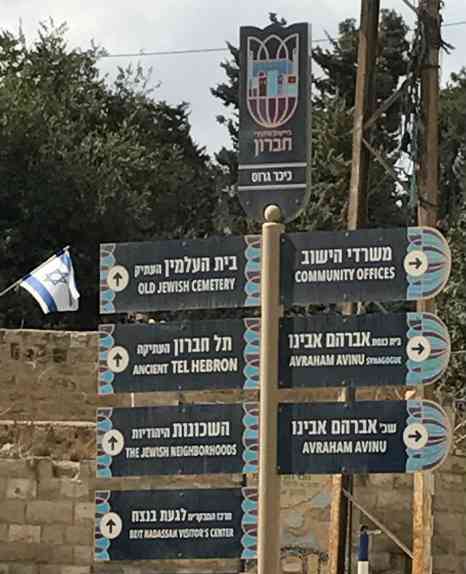Visiting Hebron, one of the first impressions that hits like a sucker-punch to the stomach is of a ghost town. Streets once bustling with thousands of Palestinians are now traversed almost exclusively by Israeli soldiers and settlers. Freedom of movement is squashed. Palestinian doors are welded shut and porches are caged in, ostensibly to protect them from the 800 settlers living in their midst. It’s hard to fathom what life is like when you cannot go out of your front door. This is occupation at its starkest.
But after this shock subsides, a more insidious, creeping form of occupation starts to draw one’s attention. Wherever we travel in the rest of Israel, we see street signs in three languages—Hebrew, Arabic, and English. It’s a recognition of Arabic’s status as an official language and a nod to the kind of coexistence that, at least in theory, Israel strives for. But here in Hebron, a lot of work has gone into painting a different picture.
Here, the street names are in Hebrew and English. No Arabic. Road signs point to Jerusalem and the settlement of Neve Samuel but not to any of the Palestinian neighborhoods or villages. It’s a pretty blatant attempt to cloak the occupation, to erase anyone’s connection to this place but the Jews’.
Hebron is often the place where trends happening elsewhere in the West Bank or in Israeli society play out in their most extreme forms. The signage is no exception. The “nation-state bill” working its way through Knesset would remove Arabic as one of Israel’s official languages. Arabic-speaking citizens would still be able to request services in Arabic, but the downgrade is just one more effort to sideline Israel’s non-Jewish citizens and permanent residents (not to mention Mizrachim, Jews from Arabic-speaking countries).
This week, we read parshat Chayei Sarah, which opens with Sarah’s death and Abraham’s purchase of the Cave of Machpelah, in Hebron, as a burial place. Thousands and thousands of Orthodox and nationalistic Jews will flock to Hebron to celebrate Judaism’s ancient claim to the city. Restrictions on Palestinians will be the tightest of any day of the year.
We, the T’ruah Israel Fellows, and our classmates in the T’ruah Year-in-Israel Program, visited Hebron this past Friday with Breaking the Silence, the organization of IDF veterans who have served in Hebron and are now committing their lives to telling the stories of what they were required to do there. Breaking the Silence’s ultimate goal is nothing less than ending the occupation. It was important for us to be there last week so that when settlers tell their story of Hebron this coming Shabbat, we can tell another story: a story of occupation, the story we saw with our own eyes.
As part of our visit, we planned to spend some time studying Torah together—specifically a midrash (Bereshit Rabbah 79:9) in which Rabbi Yudan asserts that Hebron is one of three places that the nations of the world can never accuse the Jews of stealing, because the Torah (in this week’s parshah) acts as a deed of sale. Someone, years ago, painted this midrash on the walls of a bus stop in Hebron, and we were on our way there to study it in the shade. But we were stopped by soldiers, who refused to let us continue on our route, a route that every Breaking the Silence group takes. Every trip into Hebron brings its own surprises, seemingly based on nothing more than how the soldiers on duty are feeling that day. Breaking the Silence negotiated with the soldiers to get permission for us to continue on our way. We had to wait 15 minutes for them to take our request up the chain of command and get approval, so we stood and sat by the side of the road and studied Torah right there in their faces. It was a difficult setting in which to study, but it also felt like its own significant act of Kiddush HaShem, sanctification of God’s name.
As we were getting ready to leave, another midrash surfaced among us. Later in the parshah, the Torah says that Abraham was blessed “bakol,” with everything. (Gen. 24:1) Bereshit Rabbah 59:7 interprets this to mean that Abraham had another child, a daughter named Bakol. Her voice is silenced as surely as the Palestinians’ claim to Hebron, but the rabbis create an opening through which she might speak.
In Hebron we saw a lot of red lines crossed in the name of family or security. How would a silent sister reflect on Ishmael being sent out into the desert? Or the Akedah? What would have happened if Bakol spoke in the midrash? What could she teach us today?
Perhaps, in the future, Hebron will be transformed from a place focused on burial and death to a place where the silenced get their voices back and speak up to share a multiplicity of narratives. If we reach that sacred day, it will be in part because Jews in Israel and around the world become willing to accept the idea that the Palestinians also have a legitimate claim and a right to be here, and that we will need to curtail our claim too if we are live peacefully side by side.
This d’var Torah represents the collective reflections of the 2017-2018 T’ruah Israel Fellows.


